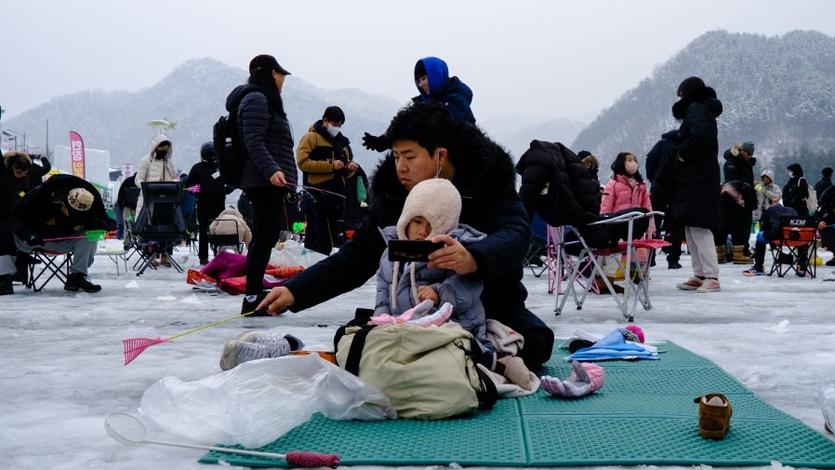 In this file photo dated Jan 7, 2023, a man holds a phone for his baby as he fishes for trout through a hole on a frozen river in Hwacheon, some 120 kilometers northeast of Seoul. (PHOTO / AFP)
In this file photo dated Jan 7, 2023, a man holds a phone for his baby as he fishes for trout through a hole on a frozen river in Hwacheon, some 120 kilometers northeast of Seoul. (PHOTO / AFP)
SEOUL - South Korea approved a Seoul city plan on Friday to let 100 foreign domestic workers into the country through a pilot program aimed at boosting birth rates by helping more women rejoin the workforce.
The issue sits at the confluence of South Korea's sharply declining birthrate, aging population, and its historical reluctance to accept more immigrants.
"Foreign domestic helpers could revitalize our society. Especially it could immediately help with career breaks," Seoul Mayor Oh Se-hoon said in a Facebook post last week.
Many Korean women face the pressure to stay home and raise families or opt not to have a child altogether due to the high cost of raising children, while the labor ministry said there is a dwindling number of young Koreans interested in domestic work.
READ MORE: South Korea's birth rate keeps falling in June
South Korea is in talks with the Philippines as one of the potential sources of workers with an aim to start the pilot program as early as December, officials said.
Under the current rules, only certain foreigners, such as spouses of Korean nationals and ethnic Koreans, are allowed to work as household workers.
Parents need more time to spend with their children, not someone to outsource raising their kids.
Park Min-ah, Co-head of Politicalmamas
The government estimates the current market price for full-time domestic workers living with the host families to cost around 3.5 million won ($2,600) to 4.5 million won a month.
The new scheme is the latest in a series of efforts by the government to reverse the plunging birth rate of Asia's fourth-largest economy.
South Korea reported the world's lowest fertility rate again in 2022, with the average number of expected babies for each woman standing at 0.78, and Seoul even lower at 0.59.
READ MORE: S. Korea expected to be one of the oldest countries in 2070
Among countries in the Organisation for Economic Co-operation and Development (OECD) the average rate was 1.59 in 2020.
Meanwhile, the country's inflow of foreign settlers as a percentage of its population is among the lowest in the OECD.
Responding to criticism that the government is importing cheap labor amid already poor conditions for household laborers, officials said the immigrant workers would be guaranteed the same 9,620 won minimum wage as Koreans.
ALSO READ: S.Korea free subway rides for elderly become political issue
"There is no one-size-fits-all solution to low birth rate," Oh said. "The point is to leave open all the possibilities as we face this crisis of our country disappearing."
Dozens of civic groups urged the government to scrap the plan, saying it should focus instead on cutting the country's long working hours.
"Parents need more time to spend with their children, not someone to outsource raising their kids," said Park Min-ah, co-head of civic group Politicalmamas.


